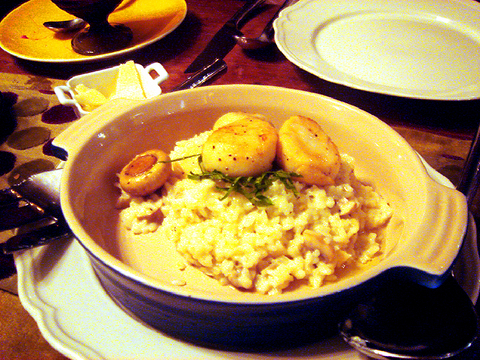The Taipei Times has twice reviewed VVG (Very Very Good) Bistro, of which VVG Table is a down-the-street offshoot. It was good then, and it remains good now. The original's cozy chaos contracts strongly with the design-conscious good-looks of the new joint.
The staff members, many of whom have studied in Europe, eschews a practice common to European-style restaurants in Taipei, which might generously be called "fusion." This is to say, instead of castrating their food to make it "conform to local taste," they spend considerable time and energy to do each dish properly.
In fact, be prepared to wait a bit for your food, because chances are that most of your order is going to be made from scratch. Past the semi-open porch and the rusticlassy wooden interior full of heavy wooden tables and an entire wall of wine, there is a beautiful open kitchen where you can see the chefs' heads bobbing over piles of fresh ingredients.

PHOTO: CHRIS PECHSTEDT, TAIPEI TIMES
The same thoughtfulness that goes into preparation and decoration goes into the menu. As I indiscreetly cast longing glances at my pumpkin soup (NT$180) and rocket salad with prosciutto, capsicum, and parmesan (NT$340), chef Vicky Huang (
The long prep-time for the main dishes makes it the sort of place where couples or larger groups with time to kill and money to burn can easily spend a long and comfortable summer evening.
Another big draw is the elaborate weekend brunch (NT$560, 11am to 4pm). This includes, but is not limited to, homemade bread, roast smoked salmon, chicken and zucchini skewers, and a dish described as "egg cups of crab and shrimp with quail egg and caviar." Cool drinks are served at strategic points through the meal, which ends with desert and cafe au lait or peppermint tea.
VVG Table is in a quiet maze of alleyways off the Zhongxiao-Dunhua intersection. It's not easy to find, but since it's made somewhat of a name for itself, most shopkeepers in the area should be able to provide directions.

Towering high above Taiwan’s capital city at 508 meters, Taipei 101 dominates the skyline. The earthquake-proof skyscraper of steel and glass has captured the imagination of professional rock climber Alex Honnold for more than a decade. Tomorrow morning, he will climb it in his signature free solo style — without ropes or protective equipment. And Netflix will broadcast it — live. The event’s announcement has drawn both excitement and trepidation, as well as some concerns over the ethical implications of attempting such a high-risk endeavor on live broadcast. Many have questioned Honnold’s desire to continues his free-solo climbs now that he’s a

As Taiwan’s second most populous city, Taichung looms large in the electoral map. Taiwanese political commentators describe it — along with neighboring Changhua County — as Taiwan’s “swing states” (搖擺州), which is a curious direct borrowing from American election terminology. In the early post-Martial Law era, Taichung was referred to as a “desert of democracy” because while the Democratic Progressive Party (DPP) was winning elections in the north and south, Taichung remained staunchly loyal to the Chinese Nationalist Party (KMT). That changed over time, but in both Changhua and Taichung, the DPP still suffers from a “one-term curse,” with the

Jan. 26 to Feb. 1 Nearly 90 years after it was last recorded, the Basay language was taught in a classroom for the first time in September last year. Over the following three months, students learned its sounds along with the customs and folktales of the Ketagalan people, who once spoke it across northern Taiwan. Although each Ketagalan settlement had its own language, Basay functioned as a common trade language. By the late 19th century, it had largely fallen out of daily use as speakers shifted to Hoklo (commonly known as Taiwanese), surviving only in fragments remembered by the elderly. In

William Liu (劉家君) moved to Kaohsiung from Nantou to live with his boyfriend Reg Hong (洪嘉佑). “In Nantou, people do not support gay rights at all and never even talk about it. Living here made me optimistic and made me realize how much I can express myself,” Liu tells the Taipei Times. Hong and his friend Cony Hsieh (謝昀希) are both active in several LGBT groups and organizations in Kaohsiung. They were among the people behind the city’s 16th Pride event in November last year, which gathered over 35,000 people. Along with others, they clearly see Kaohsiung as the nexus of LGBT rights.